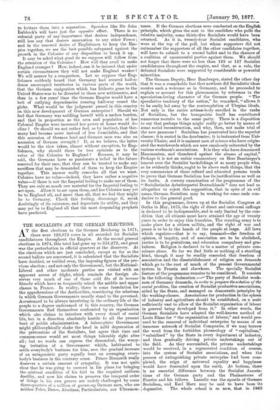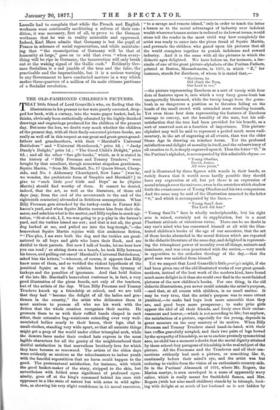THE SOCIALISTS AT THE GERMAN ELECTIONS.
AT the first elections to the German Reichstag in 1871, there were 123,975 votes in all recorded for Socialiat candidatures throughout the Empire. At the second general elections in 1874, this total had gone up to 351,272, and great was the perturbation in official quarters at the discovery. At the elections which are just concluded, except so far as the second ballots are concerned, it is calculated that the Socialists have doubled, or trebled even, the imposing figures of the pre- vious election ; and not only the Government, but the National- Liberal and other moderate parties are visited with an apparent access of fright, which reminds the foreign ob-. server very much of one of those cold fits of la terreur blanche which have so frequently seized the middle and upper classes in France. In reality, there is some foundation for the apprehensions of the Authorities, considering the relations in which German Governments usually stand to the governed. Accustomed to be always interfering in the ordinary life of the people to a degree undreamed of in this country, the German. Governments find themselves confronted by an organisation which also claims to interfere with every detail of social life, but in a direction absolutely hostile to all the present bent of public administration. A laissez-faire Government might philosophically shake the head in mild deprecation of the pretensions of the Socialists, but agree that time and common-sense would set most things tolerably right after all ; but no words can express the discomfort, the worry- ing irritation of a Government which, habituated to settle everybody's business for him, sees the gradual increase of an antagonistic party equally bent on arranging every- body's business in the contrary sense. Prince Bismarck really deserves a certain amount of sympathy. It was not quite clear that he was going to succeed in his plans for bringing the spiritual condition of his fold to the required uniform docility, and now his claims to preserve the temporal order of things in his own groove are rudely challenged by some three-quarters of a million of grown-up German men, who are neither Poles, Danes, Alsatians, Particularists, nor illtramon-
times. If the German elections were conducted on the Englitrh principle, which gives the seat to the candidate who polls the relative majority, some thirty-five Socialists would have been returned. As it is, twenty-four Socialist candidates, who were at the top of the poll, but whose supporters did not outnumber the supporters of all the other candidates together, will have to submit to a second ballot and to the chances of a coalition of unsuccessful parties against them. We should not forget that there were no less than 123 or 127 Socialist candidatures throughout the empire, and that, as a rule, the defeated Socialists were supported by considerable or powerful minorities.
The German Deputy, Herr Bamberger, stated the other day that it was a remarkable fact that nowhere did Socialistic ideas receive such a welcome as in Germany, and he proceeded to explain or account for this phenomenon by reference to the speculation-loving character of the German people. " The speculative tendency of the nation," he remarked, " allows it to be easily led away by the contemplation of Utopian ideals. Not only is the entire artisan-body enrolled in the ranks of Socialism, but the bourgeoisie itself has contributed numerous recruits to the same party. There is 41, disposition to say that perhaps things might really go better by means of some social reconstruction, and why, then, not make trial of the new panaceas ? Socialism has penetrated into the superior classes; it is seated in the Academies; it is insinuated from Unik versity Chairs; and it is eminent men of science who have origin- ated the watchwords which are now emulously reiterated by the various workmen's associations. It is they who have denounced Mammonism, and thundered against the abuses of capital." Perhaps it is not an unfair commentary on Herr Bamberger's lament over the Socialist backslidings of so many people who, as he evidently thinks, ought to be above such things, that the very concurrence of these refined and educated persons tends to prove that German Socialism has its justifications as well as its faults. A cursory examination of the programme of the " Socialistische Arbeiterpartei Dentsehlands " does not lead us altogether to reject this supposition, that in spite of an evil name, German Socialism may be working for some ends con- ducive to the general good.
In this programme, drawn up at the Socialist Congress at Gotha in May, 1875, the right of direct and universal suffrage is declared to be indispensable, and is only limited by the con- dition that all citizens must have attained the age of twenty years in order to enjoy this franchise. The standing army is to make place for a citizen militia, and the tight of war and peace is to be in the hands of the people at large. All laws which regulate—that is to say, trammel--the freedom of opinion, of inquiry, and of association are to be abolished, justice is to be gratuitous, and education compulsory and gra- tuitous. Religion is declared to be a matter of private con- science alone. So far we find little or nothing of a startling kind, though it may be readily conceded that freedom of association and the disestablishment of religion are demands which go to the root of much of the present Governmental system in Prussia and elsewhere. The specially Socialist feature of the programme remains to be considered. It consists in the following declaration :—" The party of Socialist work- men of Germany demands, in order to prepare the solution of die social problem, the creation of Socialist productive associations, aided by the State, and managed on democratic principles by the working-classes. Associations for production in the sphere of industry and agriculture should be established, on 'a scale sufficiently vast to allow of the Socialist organisation of labour in general being developed from it." In other words, the German Socialists have adopted the well-known method of Louis Blanc for " the organisation of labour," and would pro- ceed to the removal of individual enterprise by means of an immense network of Socialist Companies, if we may borrow the word from the forbidden phraseology of " capitalism," " subsidised" by the State in every department of industry, and thus gradually driving private undertakings out of the field. As they succumbed, the private undertakings would be received, in a regenerated condition of coarse, into the system of Socialist associations, and when the process of extinguishing private enterprise had been com- pleted, the reign of universal equality and happiness would have descended upon the earth. At bottom, there is no essential difference between the Socialist Associa- tions of the German party and the Phalansteres of Fourier and his fellows. Lassalle was the apostle of German Socialism, and Karl Marx may be said to have been its dogmatist. The whole school is so new, that in 18133 Lassalle had to complain that while the French and English workmen were continually meditating a reform of their con- dition, it was necessary, first of all, to prove to the German workman that he was in reality miserable and oppressed. Indeed, Karl Marx admits that Germany is but the pupil of France in schemes of social regeneration, and while maintain- ing that " the emancipation of Germany will be that of humanity, at large," goes on to add that even " when every- thing will be ripe in Germany, the insurrection will only break out at the waking signal of the Gallic cock." Evidently Ger- man Socialism is a sad jumble of the true and the false, the practicable and the impracticable, but it is a serious warning to any Government to have conducted matters in a way which makes three-quarters of a .pillion of its male citizens partisans of a Socialist revolution.



































 Previous page
Previous page